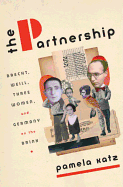
An exhilarating art scene burst forth during the tumultuous Weimar Republic, between the World Wars. The Partnership tells how five brilliant young theater artists came together in this high-stakes period to conceive revolutionary ideas and methods that would shape their later careers and achieve lasting international influence.
The Partnership hinges on the chaotic creation of The Threepenny Opera. Screenwriter, novelist and New York University professor Pamela Katz (who wrote the screenplay for Hannah Arendt) narrates the creative conflicts, financial and political pressures and uproarious clashes of egos that threatened disaster right up to opening night. Katz highlights the relationship between playwright Bertolt Brecht and composer Kurt Weill, but also paints strong portraits of their three gifted and enterprising collaborators--Elisabeth Hauptmann, Lotte Lenya and Helene Weigel--with respect for their achievements and the unconventional terms of their relationships.
She emphasizes that, despite their widely differing backgrounds and personalities, collaboration was a fundamental value for these artists, and their initial successes arose from their creative interdependence. But as Germany swung fatally to the right, and their community disintegrated and fled into exile, Brecht and Weill diverged in their political and artistic priorities, fell into territorial battles and went their separate ways.
Katz's account shifts between scholarly analysis and vivid, almost fictionalized scenes, peppered with idiosyncratic observations (and occasionally flawed by repetition). Nonetheless, her storytelling is powerful and grounded in thorough research. Her technical and cultural expertise and her personal experience with artistic collaboration are evident in her nuanced examination of the work lives and relationships of her controversial subjects. --Sara Catterall

